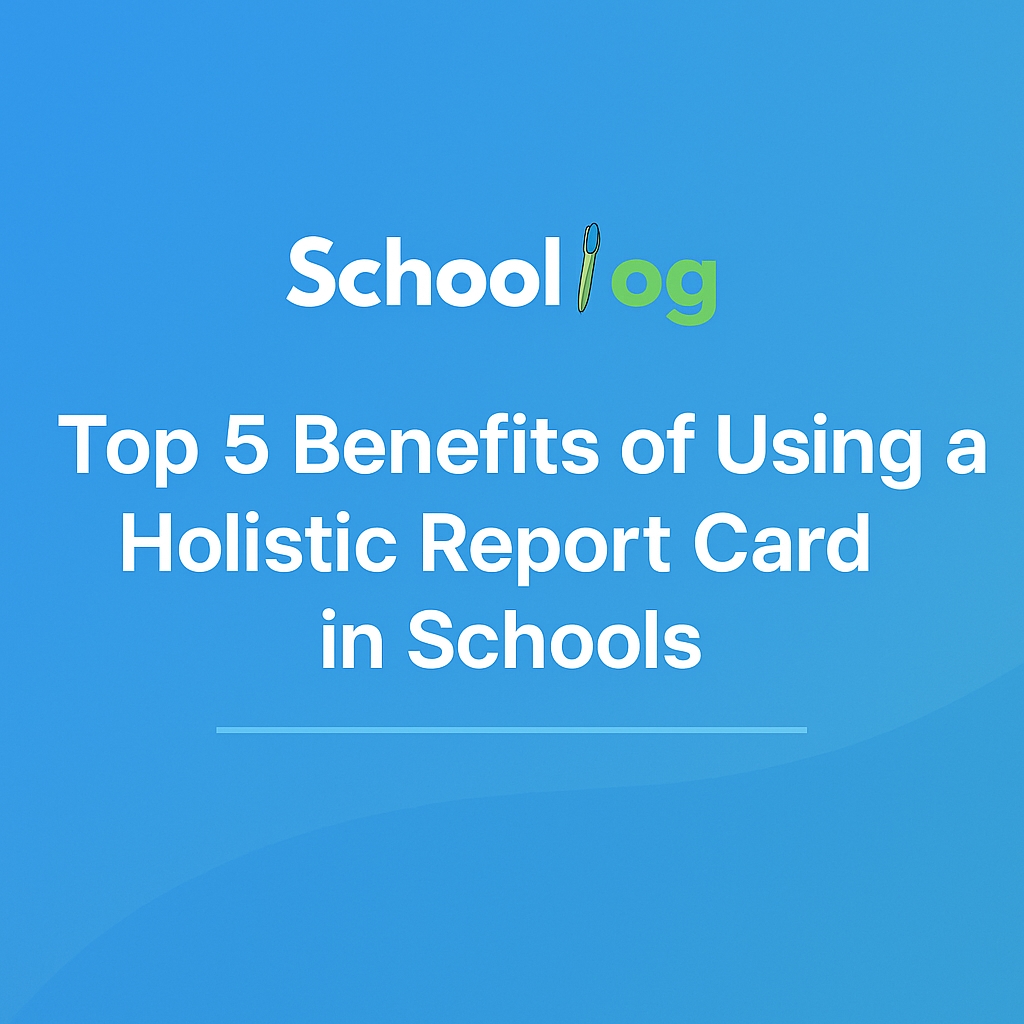
In an era where education is rapidly evolving, traditional report cards—based solely on exam scores and academic performance—are no longer sufficient to reflect a student’s complete learning journey. Today’s educators and parents demand a more nuanced, well-rounded view of a child’s development. This is where holistic report cards come into play.
For school owners, adopting a holistic assessment framework is not just an upgrade in evaluation—it’s a strategic move toward creating future-ready institutions. In this blog, we explore the top five benefits of using holistic report cards and why every progressive school should implement them.
What Is a Holistic Report Card?
A holistic report card is an educational tool that evaluates a student’s development across multiple dimensions—not just academic scores. These include emotional intelligence, social behavior, physical well-being, co-curricular participation, life skills, and moral values. The goal is to provide a 360-degree view of a learner’s growth, aligned with modern educational frameworks such as the National Education Policy (NEP) 2020 and global 21st-century learning standards.
Rather than focusing solely on test scores, holistic report cards prioritize competency-based learning, critical thinking, creativity, collaboration, and communication. They reflect the true aim of education: nurturing well-rounded, responsible, and emotionally intelligent individuals.
1. Provides a 360-Degree View of Student Development
Traditional report cards often overlook a student’s strengths outside of academic performance. A holistic report card addresses this gap by evaluating:
Cognitive skills (academic subjects)
Social and emotional learning (SEL)
Communication and collaboration
Creativity and innovation
Co-curricular involvement
Personal values and discipline
This comprehensive approach enables teachers, parents, and school leaders to understand each student’s personality, interests, and areas for support or enrichment. It’s especially helpful in identifying giftedness, special needs, or emerging talents that would otherwise remain unnoticed.
By offering a multi-faceted profile of the learner, holistic report cards support personalized learning pathways—an essential feature in any modern learning ecosystem.
2. Encourages Student-Centered Learning
Holistic assessment shifts the focus from standardized testing to student growth and engagement. Students are no longer passive recipients of information but active participants in their own learning journey.
This approach:
Promotes self-awareness and reflection
Encourages goal setting and accountability
Develops intrinsic motivation
Reduces anxiety and pressure associated with high-stakes exams
Students begin to view learning as a process rather than a race. Over time, this fosters a growth mindset, helping learners embrace challenges, learn from feedback, and take ownership of their academic and personal development.
For school owners, this translates into improved learning outcomes, better student retention, and stronger academic reputation.
3. Enhances Parent-Teacher Communication
One of the most overlooked yet impactful benefits of holistic report cards is the quality of communication they enable between schools and parents.
Instead of handing out a sheet of numbers, schools can now provide a narrative-based evaluation supported by teacher observations, rubrics, and personalized feedback. This allows parents to:
Understand their child’s emotional and social development
Track co-curricular involvement and talents
Collaborate more effectively with teachers
Address concerns early and constructively
When parents feel well-informed and involved, they are more likely to trust the school’s vision and remain loyal to the institution—something every school owner values.
4. Improves Teacher Feedback and Evaluation Practices
Holistic report cards encourage teachers to go beyond marking exam papers. They must observe, document, and assess students in real-time across multiple dimensions.
This leads to:
Deeper insight into student behavior and learning styles
Use of structured rubrics and assessment tools
Improved documentation for internal reviews and inspections
Early intervention in cases of learning difficulties or behavioral concerns
Moreover, schools can leverage digital platforms that simplify the process of collecting, analyzing, and presenting holistic data. These tools reduce administrative burden while maintaining accuracy and consistency in reporting.
For school owners, this results in better teaching practices, increased educator satisfaction, and data-driven decision-making.
5. Supports School Branding and Competitive Edge
In a highly competitive educational environment, a school’s value proposition must go beyond academic results. Modern parents seek institutions that prepare children for life—not just exams.
Implementing holistic report cards allows schools to:
Position themselves as child-centric and progressive
Demonstrate alignment with national education reforms (such as NEP 2020)
Appeal to parents who value emotional well-being, creativity, and leadership skills
Differentiate from schools that still rely on outdated reporting methods
By embracing holistic evaluation, school owners can elevate their institution’s image, attract quality admissions, and retain families who value long-term development over short-term grades.
How to Implement Holistic Report Cards in Your School
If you're considering the shift to holistic assessment, here are a few practical steps:
Assess Your Current System: Identify gaps in your existing report card model.
Choose a Framework: Align with NEP 2020, CBSE guidelines, or an international curriculum such as IB or Cambridge.
Invest in Teacher Training: Ensure educators are equipped to observe, record, and evaluate non-academic indicators.
Select a Digital Platform: Use tools like Schoollog, Report Bee, or Toddle to automate and manage the process.
Communicate With Parents: Clearly explain the benefits, structure, and purpose of the new system.
Start Small: Pilot in select grades before expanding school-wide.
Case in Point: A Success Story
One private school in Pune transitioned to a holistic report card system in 2022. After implementing the model:
Parent satisfaction scores increased by 30%
Teacher feedback became more structured and actionable
The school saw improved student participation in co-curricular programs
Annual admissions rose due to word-of-mouth endorsements
This case underscores the transformative impact of adopting holistic assessment—not just for students, but for the entire school ecosystem.
Conclusion
Holistic report cards are no longer a futuristic concept—they are a critical necessity in delivering quality, inclusive, and future-ready education. For school owners looking to stay ahead of the curve, adopting this comprehensive assessment model offers:
Stronger academic and emotional outcomes
Enhanced institutional credibility and brand value
By focusing on the whole child, your school sends a powerful message: that education is not just about passing exams, but about building character, resilience, and lifelong learners.
